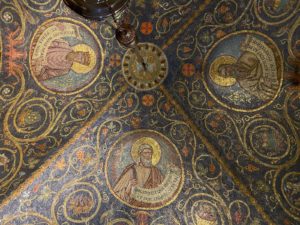The Gospels record the words of Jesus in Greek, the common language of the area, although he mostly spoke Aramaic. There are very few exceptions, and the most notable is this phrase from the cross: “‘Eloi Eloi lema sabachthani?’ (which means: ‘My God, my God, why have you forsaken me?’)” (Mk 15:34 and Mt 27:46). Why do they write this phrase in the original language? It is the beginning of Psalm 22, as its title, and if the title of a song is translated, it becomes difficult to recognize. The evangelists wanted the readers to recognize it so that they would understand that Jesus was indicating to them that it was a prophecy of what was taking place.
For example, “the chief priests and the scribes mocked him among themselves and said, ‘He saved others; he cannot save himself’” (Mk 15:31) and also “He trusted in God; let him deliver him now if he wants him” (Mt 27:43), and in the psalm it reads: “But I am a worm, not a man, scorned by men, despised by the people. All who see me mock me; they curl their lips and jeer; they shake their heads at me ‘He relied on the LORD—let him deliver him; if he loves him, let him rescue him’” (Ps 22:7-9), and further on “they stare and gloat” (Ps 22:18).
The psalm announced the crucifixion saying, “they have pierced my hands and my feet” (Ps 22:17), and even predicted what the soldiers did: “they divide my garments among them; for my clothing they cast lots” (Ps 22:19).
In the crucifixion, the executioners dislocated the bones of the arms forcefully so that he would keep his arms extended; the heart would lose its strength and would be unable to transmit it to the rest of the body; and the loss of blood produced great thirst. Thus, the psalm expresses: “Like water my life drains away; all my bones are disjointed. My heart has become like wax, it melts away within me. As dry as a potsherd is my throat; my tongue cleaves to my palate; you lay me in the dust of death” (Ps 22:15-16). And, finally, they broke the legs of the two thieves, but he was already dead, and they again fulfilled the psalm: “I can count all my bones” (Ps 22:18).
Psalm 22 was written by David 1000 years before Christ as if he “was living” what Jesus was going to suffer. Therefore, it is one of the four prophecies represented on the ceiling of the Catholic chapel at Calvary, along with Isaiah 53:7, Daniel 9:26, and Zechariah 12:10.
By D. Joaquín Paniello, Priest

Ceiling of the Catholic Chapel at the Calvary
